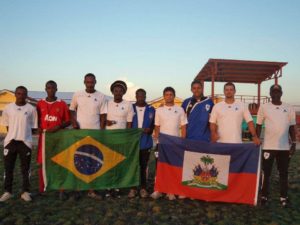 In 2004, the United Nations (UN) invited Viva Rio to participate in its peace mission in Haiti, due to our experience mediating conflicts in the communities of Rio de Janeiro. We arrived in Port-au-Prince, the capital of the Caribbean nation, to deal with armed clashes between rival gangs and a population suffering from precarious services in the midst of a war zone.
In 2004, the United Nations (UN) invited Viva Rio to participate in its peace mission in Haiti, due to our experience mediating conflicts in the communities of Rio de Janeiro. We arrived in Port-au-Prince, the capital of the Caribbean nation, to deal with armed clashes between rival gangs and a population suffering from precarious services in the midst of a war zone.
Our mission was to reach out to the opposing groups with a proposal for resolving the conflict, which led to the signing of some peace deals. We had to find methods of dialogue, as well as entering places that seemed impenetrable, which we did by sharing joy, cheerfulness, and a positive attitude – powerful devices where hopelessness is dominant. We were able to establish communication with the most violent neighborhoods by bringing music to the youth, supporting popular festivals and bringing communities together on occasions ranging from traditional ceremonies to carnival street parades.
Standing up against violence means providing alternatives. We opened a community center in the most troubled area of the city and we are still working there today, offering sports and cultural programs. We also promoted water and sewage treatment initiatives, clean-up efforts and civic education actions. It was in Haiti that the Black Pearls Academy emerged, a pioneering football club founded by Viva Rio. The club serves as a home, school, and training center for young people seeking a better future through football.
Our team also provided first aid on the recovery efforts following the earthquake that devastated Haiti in 2010. Our familiarity and experience in the country was crucial in supporting international humanitarian bodies that arrived with no knowledge of the local streets. When the emergency teams left, we stayed to help people rebuild life and the country in the aftermath of a catastrophe that killed more than 250,000 people.
Our experiences in Haiti and Rio de Janeiro helped us to develop a kind of social technology that can be applied in other vulnerable areas. It involves an ability to deal with local social agents and engage in communities affected by poverty and violence, acting as a mediator between them and the world outside these regions, always aiming to improve the quality of life of residents.